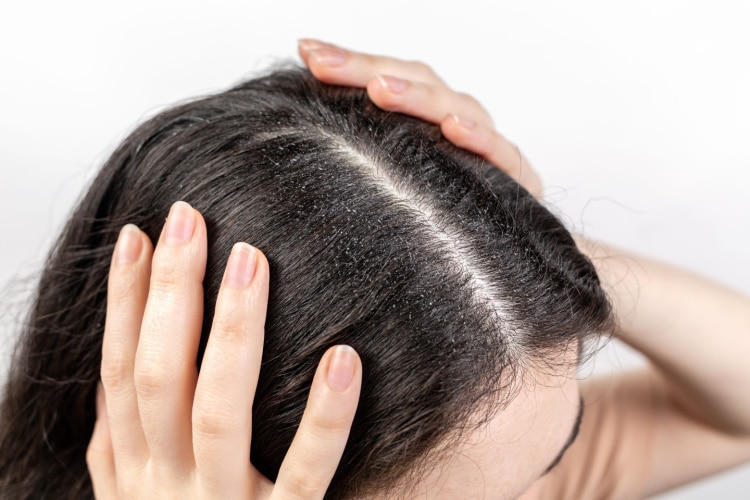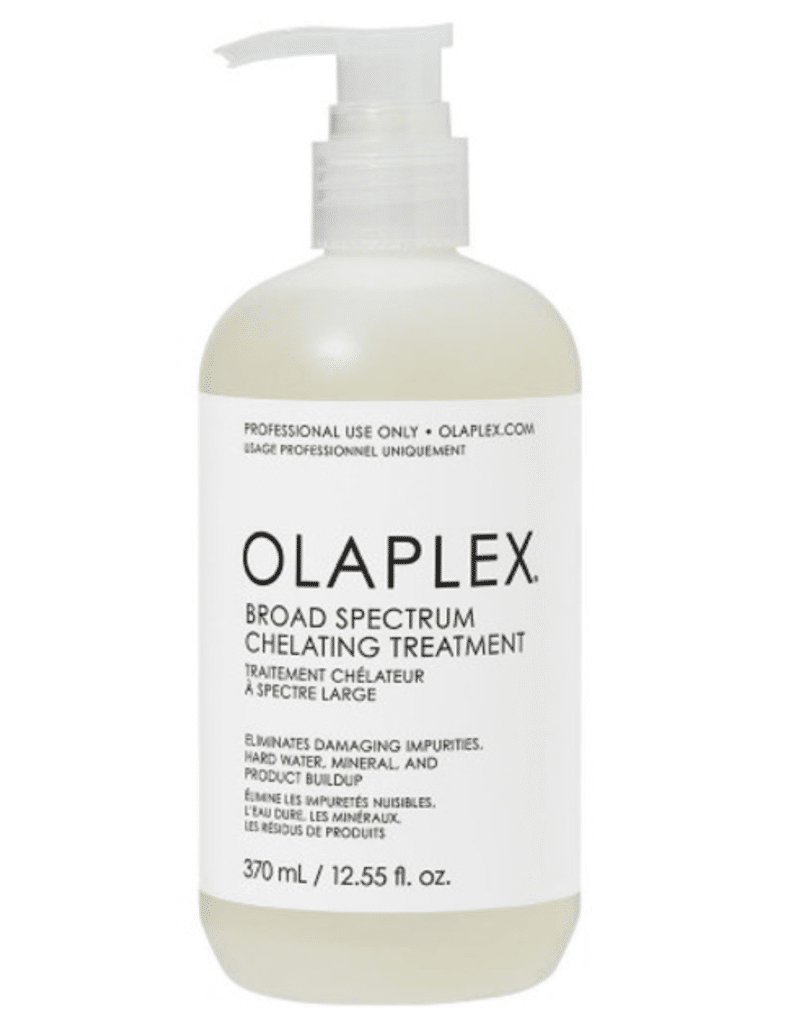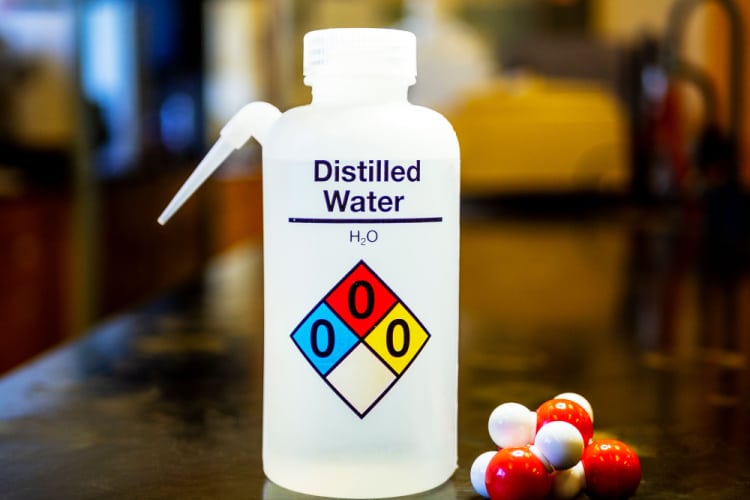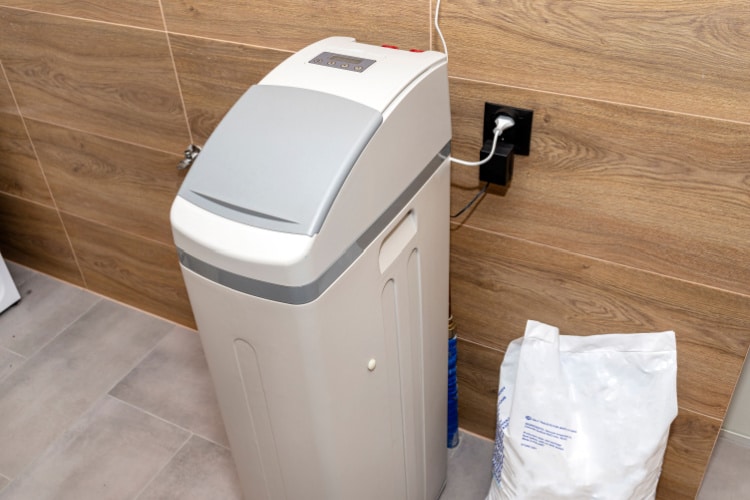Hard water causes many issues. For example, it speeds up the formation of limescale, can make clothes look washed out, irritate your skin, and lead to other inconveniences.
But can you add dandruff to the long list of issues caused by hard water?
According to the research we’ve found, yes, you probably can – but not always. Among other things, hard water can irritate and dry out the scalp, which in many cases leads to dandruff.
To better understand how hard water might affect the skin and hair, let’s explain what exactly hard water is, why and how it might lead to dandruff, and how you can prevent this issue from happening again.

The Basics: Skin and Hard Water
The first step in understanding this complex issue is to know what hard water is and the physiology behind healthy skin.
Hard water is defined as any water that has high mineral content, more specifically, dissolved calcium and magnesium. According to the USGS, water is classified into different categories based on the following concentrations of minerals:
- Soft water is from 0 to 60 mg/L (milligrams per liter)
- Moderately hard water is 61 to 120 mg/L
- Hard water is 121 to 180 mg/L
- Very hard water is higher than180 mg/L
Why is this important for dandruff?
Well, the scalp is basically the skin beneath our hair, and just like the skin on our face and body, it’s affected by the same factors that affect overall skin health, such as genetics, environment, diet, and personal care practices.
And while drinking mineral-rich water is great for skin health, applying mineral-rich, i.e., hard water externally, for example, when we shower and wash our head, is not, as the minerals within the water stay on top of our skin. This is especially the case with our scalp because the skin there is covered in hair.
The scalp is also home to thousands of tiny blood vessels that provide nutrients to the hair follicles, keeping the hair and scalp healthy. So, you can imagine how mineral residue building on top of the scalp can deteriorate the health of the skin and hair in this area.
Let’s explain this better by examining exactly why hard water might lead to dandruff.
How Does Hard Water Cause Dandruff?
Dandruff is a common scalp condition characterized by dry, flaking, and itching scalp. Therefore, anything that irritates our scalp, dries it out, or makes the skin flaky can cause or exacerbate dandruff symptoms.
Consequently, many different things are associated with dandruff, including yeast, dry skin, oily skin, certain medical conditions, hormonal changes, stress, and an unhealthy diet.
In the previous section, we explained how hard water is mineral-rich and leaves a mineral residue when applied to the skin. When not rinsed thoroughly, this mineral residue irritates the skin and dries it out by blocking the pores. Dry and irritated skin is prone to dandruff, especially for people with sensitive skin.
However, the problem runs deeper than this. Hard water might lead to dandruff in another sneaky way, which has to do with the way it interacts with shampoos and soaps. Let’s explain.
How Does Hard Water Affect Hair Products?
Hard water makes it more difficult for soap or shampoo to form a lather. This is because of the high concentrations of minerals in hard water, particularly calcium and magnesium. These minerals can interact with the surfactants in shampoo, neutralizing their ability to create suds and foam.
Surfactants are the ingredients in shampoos and soaps that give them their cleaning properties – they break down oils and dirt, allowing them to be rinsed away. The minerals in hard water can bind to them, making shampoos less effective in creating a lather.
This means fewer suds, which in turns makes working shampoo into the hair and scalp harder and less effective in cleaning them.
Aside from the fact it makes them less effective, shampoos not forming a lather is also a problem because it makes them more difficult to rinse and leads to build-up of mineral deposits and product residue.
In other words, when shampoo residue is stuck to your scalp for long periods, it prevents the natural oil the scalp produces from moisturizing both your scalp and hair The hard water and soap also form a film on your hair and prevent skin cells from getting washed off properly. The dead skin cells then clump together and form white flakes.
To Sum Up
In conclusion, hard water can cause dandruff by both irritating the skin and making it dry and by rendering shampoos ineffective which can lead to a buildup of dirt and oils on the scalp.
The minerals in hard water can be hard to rinse as they stick to the scalp. Plus, they interact with the surfactants in shampoo, neutralizing their ability to create suds and foam, making it difficult to clean the hair and scalp effectively when you’re in the shower.
The negative effects of showering or washing your hair with hard water can cause dandruff or exacerbate dandruff symptoms – especially in people with sensitive skin.
To combat these negative effects, you should only wash your hair with soft water or use a chelating shampoo. In the next section, we’ll explain these solutions in detail.
How to Remove Dandruff Caused by Hard Water
If you keep washing your hair with hard water, your scalp problems will likely persist. Therefore, the best way to get rid of dandruff symptoms caused by hard water is to wash your hair with soft water. Another thing you can try is a chelating shampoo.
Chelating Shampoo

A chelating shampoo is a type of shampoo that is specifically designed to remove the buildup of minerals and other impurities from the hair and scalp. These shampoos contain chelating agents, which are molecules that can bind to and remove mineral and metal molecules. In fact, in medicine, chelating agents are used to remove toxic metals from the body.
The main function of chelating shampoos is removing mineral buildup that causes hair to look dull, feel heavy, and be difficult to style. But they also remove the buildup of chlorine, iron, copper, and other minerals that may be present in hard water.
Additionally, they can help remove product buildup from hair sprays, gels, and waxes that can make your hair look greasy and dull.
Thanks to these properties, chelating shampoos can be effective in reducing dandruff symptoms. They’re often recommended for people who have hard water at home, as well as for people experiencing hair problems such as hair loss, breakage, or dandruff.
It’s worth noting that chelating shampoos can be quite strong and may cause dryness, so it’s important to use them in moderation and follow the instructions on the label.
Distilled or Purified Water

Another solution for people with dandruff is to wash their hair with distilled or purified water.
Since distilled and purified water is water free of minerals, washing your hair with these types of water can help remove the mineral deposits from it, leaving the hair and scalp feeling clean and refreshed.
Distilled water is water that has been boiled to remove impurities and minerals. Since you can do this at home, it presents a very affordable way to get access to soft and mineral-free water for hair washing. All you need to do is boil the water before washing your hair with it. The only trade-off is that it can be impractical and time-consuming.
Purified water has been mechanically filtered or processed to remove impurities and minerals. Usually, purified water refers to bottled water provided by water companies for people that need mineral- and contaminant-free water. This is a practical solution, but very expensive. Buying purified water might not be a sensible solution in the long run.
For a permanent solution, you should consider installing a water softener.
How to Prevent It From Happening Again

If you want to prevent dandruff as a result of hard water, you need a more practical and permanent solution than softening your water before each wash. The best way to do that is to buy a water softener.
Water softeners are specifically designed to address the issues caused by hard water by treating water through a process known as ion exchange. Through this process, the magnesium and calcium minerals in mineral-rich water get replaced with sodium ions, which results in softened water that can’t cause or exacerbate the skin and hair problems associated with hard water.
After washing your hair with soft water for a few months, the skin on the scalp should slowly go back to normal, and your dandruff symptoms should reduce or disappear completely.
If you still have dandruff after installing a water softener for your shower, then you might consider other causes for your condition.